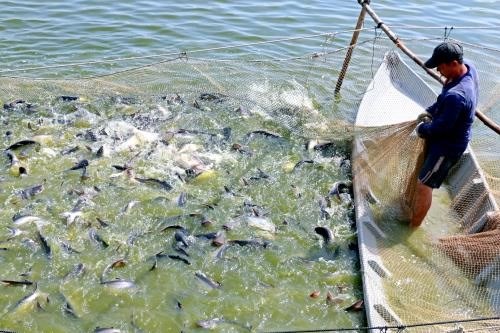
Dong Thap province, already the largest tra fish producer in the Mekong Delta, has further increased the breeding area this year because of the high prices the fish is fetching.

A tra fish
farm in Dong Thap province’s Thanh Binh district.(Source: VNA)
The area has increased by 20 percent to 1,381ha, including 200ha
of new ponds.
The price of the fish at the pond has risen by 5,000-6,000 VND per kilogramme
since last year to 28,000-30,000VND (1.2- 1.3 USD), fetching farmers large
profits.
So far this year nearly 300ha of tra ponds have been harvested, with output
being more than 100,000 tonnes, up nearly 5 percent year-on-year, according to
the Dong Thap Fisheries Sub-department.
Le Hoang Vu, head of the sub-department, said the province is developing a
model of tra farming based on contracts between farmers and processors.
Under the contracts they sign, farmers do not worry about working capital or
selling their output because the processors provide them with fish feed and
farming techniques.
In more than 60 percent of the breeding areas farmers have adopted quality
standards such as global GAP or VietGAP.
Most tra processors in the province either manage to sign deals or have their
own breeding areas to secure more than 60 percent of their raw fish supply.
The prices of the fish are expected to remain high because export demand
remains high while output has not increased much.
With tra fetching high prices, many farmers in Dong Thap are digging ponds even
in unzoned areas to breed the fish.
Tan Hong district and Hong Ngu town have 43ha and 18ha of new ponds in unzoned
areas.
Nguyen Van Hoang, a local in Tan Phuoc commune, said the selling of paddy
fields for turning them into tra ponds has gathered pace in the last two
months.
Nguyen Thanh Tuan, Vice Chairman of the Tan Phuoc commune People’s Committee,
said competent agencies have been ordered to work with farmers to stop the
digging of tra fish ponds in unzoned areas.
People continuing to dig in unauthorised areas would be reported to the
district’s People’s Committee, he warned.
Source: VNA
Hoa Binh province’s economy posted an impressive Gross Regional Domestic Product (GRDP) growth rate of 12.67% in the first quarter of 2025, representing a 12.76% year-on-year increase, the highest rate recorded since the beginning of the current tenure, according to the provincial Statistics Office. This robust growth reflects years of strategic groundwork and sets a strong foundation for the province’s annual growth target of over 10%.
With a focus on cash crop farming with science - technology application and brand building, Lac Thuy district is gradually increasing production value, improving people's life quality, and laying the foundation for sustainable socio-economic development.
In recent years, the economic development model "Hoa Binh Earthworm Farm” run by Mr. Bui Van Dang in Co Giua Hamlet, My Thanh Commune (Lac Son district) has not only brought stable economic value but it is also environmentally friendly, helping to protect and reduce pollution, contributing to the construction of a green and sustainable agriculture.
Dao Village’s honey – a product certified with a 3-star OCOP (One Commune One Product) rating by Thong Nhat Agricultural Cooperative in Dao Village (Hoa Binh City) – is highly regarded by consumers for its quality, richness, and variety in packaging. The distinctively sweet taste of Dao Village’s honey leaves a lasting impression on anyone who has tried it.
In alignment with Project No. 07-DA/TU, issued by the Hoa Binh provincial Party Committee on November 1, 2021, Lac Thuy district has actively promoted investment and supported the sustainable development of its industrial and handicraft sectors during the 2021–2025 period. Alongside this, the district has remained committed to preserving and revitalising traditional craft villages.
Located in the northern part of Lac Thuy district, with a temperate climate and fertile soil, Phu Thanh commune has great potential and advantages in growing tea. The long-standing experience, combined with strict adherence to organic farming practices in the tea gardens, ensures that the dried tea products from Phu Thanh and Lac Thuy as a whole are sold out immediately upon production, providing a stable and prosperous life for the local people.



